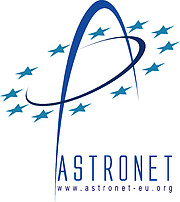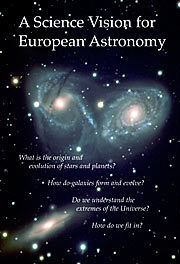Press Release
A Grand Vision for European Astronomy
Europe unveils its Scientific Strategies for the next 20 Years
28 September 2007
Today, and for the first time, astronomers share their global Science Vision for European Astronomy in the next two decades. This two-year long effort by the ASTRONET network of funding agencies, sponsored by the European Commission and coordinated by INSU-CNRS, underscores Europe's ascension to world leadership in astronomy and its will to maintain that position. It will be followed in just over a year by a prioritised roadmap for the observational facilities needed to implement the Vision. Implementation of these plans will ensure that Europe fully contributes to Mankind's ever deeper understanding of the wonders of our Universe.
"This is a great opportunity to help create a vibrant long-term future for astronomy and science" says Tim de Zeeuw (Leiden Observatory, The Netherlands) who led this community-wide effort.
The ASTRONET Science Vision provides a comprehensive overview of the most important scientific questions that European astronomy should address in the next twenty years. The four key questions are the extremes of the Universe, from the nature of the dark matter and dark energy that comprise over 95% of the Universe to the physics of extreme objects such as black holes, neutron stars, and gamma-ray bursts; the formation of galaxies from the first seeds to our Milky Way; the formation of stars and planets and the origin of life; and the crucial question of how do we (and our Solar System) fit in the global picture. These themes reach well beyond the realm of traditional astronomy into the frontiers of physics and biology.
The Vision identifies the major new facilities that will be needed to achieve these goals, but also stresses the need for parallel developments in theory and numerical simulations, high-performance computing resources, efficient astronomical data archiving and the European Virtual Observatory, as well as in laboratory astrophysics.
"This report is a key input for the even more challenging task of developing a prioritised, community-based Infrastructure Roadmap, crucial to keep Europe at the forefront of astronomical research," says de Zeeuw.
European astronomy today is fully competitive on the global scene and is at the forefront in many domains with such breakthroughs as the first detection of a planet around a sun-like star, the successful landing on Titan, the proof that a massive black hole exists in the centre of our own Galaxy, the discovery of gravitational arcs around galaxy clusters, and the proof that most Gamma Ray Bursts are caused by huge exploding stars. The rise of European astronomy to this top position by the end of last century has been achieved through extensive cooperation and coordination of efforts, in particular through ESO for optical astronomy and ESA for space astronomy.
To strengthen this position and to extend it to all branches of astronomy and all nations of the new Europe, a group of European funding agencies set up the ASTRONET programme with the goal to establish a comprehensive long-term development plan of European astronomy. ASTRONET therefore covers all astrophysical domains from cosmology to the Solar system, and every observing window, from space and from the ground, and from electromagnetic radiation to particles and gravitational waves. It addresses the whole astronomical 'food chain' from infrastructure and technology development to observation, data access, modelling and theory, and the human resources needed to make it all work.
This effort is quite similar in scope to the 'decadal surveys' conducted in the USA over the last half-century, but unlike its American counterpart, ASTRONET was set up directly by the national funding agencies, with strong support from the European Commission.
"A shared long-term Science Vision for European astronomy is the fundamental first step in the process, soon to be followed by a detailed infrastructure and technology development roadmap," says Johannes Andersen (NOTSA, Denmark), the ASTRONET Board Chair. "Both will be updated regularly as scientific and/or technological breakthroughs materialize."
The first stepping stone is the Science Vision document released today. This is the result of intense work by thematic panels drawn from the community, with detailed mid-term feedback from the community at large through a web forum and an open Symposium that took place earlier this year in Poitiers, France, and in which 228 scientists from 31 countries participated.
Preparation of the detailed Infrastructure Roadmap has already begun. Getting the community to agree on a common set of priorities, hard choices, and delicate balances will be a tough task, but, adds de Zeeuw, "If we don't hang together, we will surely hang separately!"
Some background information on the ASTRONET Science Vision is also available. The ASTRONET Science Vision is available in PDF format in either low (17 MB) or normal (47 MB) resolution.
Notes
(1) The ASTRONET consortium is currently supported by 20 participating funding agencies from across Europe: CNRS/INSU, coordinator (France), FWF (Austria), ETF (Estonia), BMBF/PT-DESY, MPG & DFG (Germany), GNCA (Greece), HAS (Hungary), ISA (Israel), INAF (Italy), LAS (Lithuania), NWO (Netherlands), NOTSA (Nordic Countries), MEC (Spain), SRC (Sweden), STFC (United Kingdom), IA SAS (Slovakia), SER (Switzerland), ESO and ESA. The project started in September 2005 for a 4-year period. ASTRONET is an ERA-Net supported by the European Commission FP6 programme under the initiative "Integrating and Strengthening the European Research Area (ERA)". The ASTRONET website is at http://www.astronet-eu.org/.
(2) The overall Science Vision programme was managed by ESO & NWO, with the scientific effort led by T. de Zeeuw of Leiden Observatory and F. Molster of NWO. The ongoing infrastructure road-mapping is conducted by M. Bode of John Moores University, Liverpool (United Kingdom).
As befitted such a pan-European exercise, this Press release is launched jointly by the various ASTRONET participants. Contacts for the media are listed on a separate page.
Contacts
As befitted such a pan-European exercise, this Press release is launched jointly by the various ASTRONET participants. Contacts for the media are listed on a separate page.
Our use of Cookies
We use cookies that are essential for accessing our websites and using our services. We also use cookies to analyse, measure and improve our websites’ performance, to enable content sharing via social media and to display media content hosted on third-party platforms.
ESO Cookies Policy
The European Organisation for Astronomical Research in the Southern Hemisphere (ESO) is the pre-eminent intergovernmental science and technology organisation in astronomy. It carries out an ambitious programme focused on the design, construction and operation of powerful ground-based observing facilities for astronomy.
This Cookies Policy is intended to provide clarity by outlining the cookies used on the ESO public websites, their functions, the options you have for controlling them, and the ways you can contact us for additional details.
What are cookies?
Cookies are small pieces of data stored on your device by websites you visit. They serve various purposes, such as remembering login credentials and preferences and enhance your browsing experience.
Categories of cookies we use
Essential cookies (always active): These cookies are strictly necessary for the proper functioning of our website. Without these cookies, the website cannot operate correctly, and certain services, such as logging in or accessing secure areas, may not be available; because they are essential for the website’s operation, they cannot be disabled.
Functional Cookies: These cookies enhance your browsing experience by enabling additional features and personalization, such as remembering your preferences and settings. While not strictly necessary for the website to function, they improve usability and convenience; these cookies are only placed if you provide your consent.
Analytics cookies: These cookies collect information about how visitors interact with our website, such as which pages are visited most often and how users navigate the site. This data helps us improve website performance, optimize content, and enhance the user experience; these cookies are only placed if you provide your consent. We use the following analytics cookies.
Matomo Cookies:
This website uses Matomo (formerly Piwik), an open source software which enables the statistical analysis of website visits. Matomo uses cookies (text files) which are saved on your computer and which allow us to analyze how you use our website. The website user information generated by the cookies will only be saved on the servers of our IT Department. We use this information to analyze www.eso.org visits and to prepare reports on website activities. These data will not be disclosed to third parties.
On behalf of ESO, Matomo will use this information for the purpose of evaluating your use of the website, compiling reports on website activity and providing other services relating to website activity and internet usage.
Matomo cookies settings:
Additional Third-party cookies on ESO websites: some of our pages display content from external providers, e.g. YouTube.
Such third-party services are outside of ESO control and may, at any time, change their terms of service, use of cookies, etc.
YouTube: Some videos on the ESO website are embedded from ESO’s official YouTube channel. We have enabled YouTube’s privacy-enhanced mode, meaning that no cookies are set unless the user actively clicks on the video to play it. Additionally, in this mode, YouTube does not store any personally identifiable cookie data for embedded video playbacks. For more details, please refer to YouTube’s embedding videos information page.
Cookies can also be classified based on the following elements.
Regarding the domain, there are:
- First-party cookies, set by the website you are currently visiting. They are stored by the same domain that you are browsing and are used to enhance your experience on that site;
- Third-party cookies, set by a domain other than the one you are currently visiting.
As for their duration, cookies can be:
- Browser-session cookies, which are deleted when the user closes the browser;
- Stored cookies, which stay on the user's device for a predetermined period of time.
How to manage cookies
Cookie settings: You can modify your cookie choices for the ESO webpages at any time by clicking on the link Cookie settings at the bottom of any page.
In your browser: If you wish to delete cookies or instruct your browser to delete or block cookies by default, please visit the help pages of your browser:
Please be aware that if you delete or decline cookies, certain functionalities of our website may be not be available and your browsing experience may be affected.
You can set most browsers to prevent any cookies being placed on your device, but you may then have to manually adjust some preferences every time you visit a site/page. And some services and functionalities may not work properly at all (e.g. profile logging-in, shop check out).
Updates to the ESO Cookies Policy
The ESO Cookies Policy may be subject to future updates, which will be made available on this page.
Additional information
For any queries related to cookies, please contact: pdprATesoDOTorg.
As ESO public webpages are managed by our Department of Communication, your questions will be dealt with the support of the said Department.



